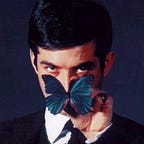On Organization.
Historically speaking, the march of time from past to future appears to coincide with a progression from equilibrium to equilibrium, yet with markedly shifted foci. Every choice that’s made adds a new ingredient to the recipe, further refining the flavor of the future. But, continuing with the metaphor, too many cooks may well spoil the broth. But this result can always be overcome by using it as the basis for an entirely new dish.
This kind of paradigm shift may be, naively, beyond the scope of those poised to make it. However, given the proper instrument, a tool to extend one’s reach beyond its normal capacity, a quantum leap may be realized. This is the driving principle behind all technology, and we see its staggering impact on the ever-accelerating progress of our civilization every day. But one fundamental instance of technology that is often overlooked or taken for granted is the notion of the Organization.
The function of the Organization is to strategically arrange elements and resources in pursuit of a higher purpose that could not be reached otherwise. However, the accomplishment of this purpose must inevitably lead to the obsolescence of the Organization, by its very definition. Often though, by the time its purpose has come to fruition, the bulk of the Organization has forgotten its origins. Then, rather than embracing either dissolution or further evolution, the Organization becomes reactionary. At this late stage, then, the Organization exists only for its own sake, espousing the idea that it is fixed and immutable — that it is sovereign. In reality, however, this is a case of self-indulgent narcissism, and a programme of traditional values which are no longer motivated leads to a gradual descent into oppressive conformity and decadence.
This is a mirror of the personal Ego in the wider world. Originally an instrument for the perception of and interpretation of the baser world, intended as a lever for probing our loftier selves, but misappropriated over the long ages as a self-centered and self-elevating I. It is vital that we continue to strive for a level of understanding and influence outside of our reach, and in fact it is central to our role as representatives, the eyes and ears, of the cosmos which birthed us. But the higher purpose we aim for must not be viewed merely as a jumping-off point to set our autonomous, lumbering creation rampaging through the streets, or the psyche. Instead, the higher purpose should be viewed as a teleistic attractor, which, reaching back from the future, pulls together the Organization and steers it unwaveringly towards its intended ends. In other words, the purpose must always be held in the mind and never lost, lest we create dragons and false gods with tortuous and ensnaring designs on us. These entities are always organized and constructed of more fundamental elements; never fundamental in themselves. They are self-driven technology, deeply imbued with the inevitable flaws of their programmers. It is the higher purpose that is fundamental and pure, and must be recalled for the knotted cord to be finally untied. The building blocks must ever be disassembled, reassembled for a new higher purpose, and disassembled once more. With each cycle, we climb another rung in our ascent rather than contenting ourselves to be the People of Rung City.
